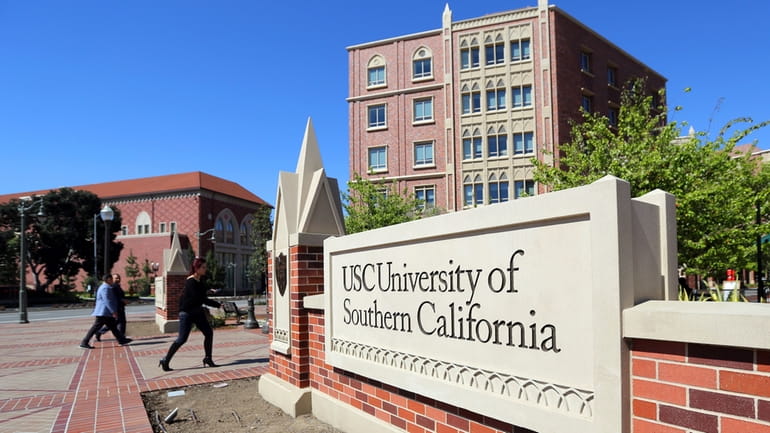Testimony in USC case before labor relations board administrative judge could be wrapping up

This March 12, 2019, file photo shows the University Village area of the University of Southern California in Los Angeles. A National Labor Relations Board’s complaint against the University of Southern California, NCAA and Pac-12 Conference could enter a new stage by the end of the week. Credit: AP/Reed Saxon
LOS ANGELES — A National Labor Relations Board complaint against the University of Southern California that alleges student-athletes should be classified as employees could be entering a new stage by the end of the week.
In a statement to The Associated Press, USC said the final set of witnesses for all three entities named in the complaint — the university, the NCAA and the Pac-12 Conference — will testify when the hearing resumes Tuesday for three days before an administrative judge in Los Angeles.
The NLRB’s Los Angeles office filed its complaint last May and amended it three months later. It alleges players on USC’s football and men’s and women’s basketball teams are employees and not “student-athletes” within the meaning of the National Labor Relations Act.
The NCAA and Pac-12 are part of the complaint because the NLRB considers them joint employers. The NLRB also said the school, national governing body and conference have misclassified players as student-athletes and cited examples from USC’s student-athlete handbook.
Once testimony is completed, the judge’s decision will take at least a couple of months.
Jodi Balsam, a professor of clinical law at NYU’s Brooklyn Law School, said once the decision is issued, there will be a series of appeals.
The first step is to appeal to the full NLRB board. The losing party can then appeal the board’s decision in federal court.
"The end game for the universities is to get into federal court and relitigate whether students should be considered employees,” she said. “The idea is that the NLRB decision-making process has lately been heavily politicized. The Biden administration has, in no uncertain terms, in a series of executive orders, declared that one of their priorities in this administration is worker empowerment. They want to expansively define the concept of employee, not just in the college context, but throughout the economy.”
The USC case is different from the one Dartmouth College’s basketball players won in February. The Dartmouth players petitioned the NLRB to hold a union election.
The players voted 13-2 to form the union, but the college has said it will not enter into collective bargaining. That would send the case to federal court.
As an Ivy League school, Dartmouth does not have athletic scholarships while USC does.
In 2021, NLRB general counsel Jennifer Abruzzo issued guidance allowing athletes from private colleges to unionize and negotiate over working conditions because she viewed college athletes who earn millions for universities as employees.
USC said in a statement, “testimony from all witnesses has been consistent, establishing that our student-athletes — including those on our football and basketball teams — are not and never have been employees of the university.
“Witnesses have testified about the university’s continuous focus on the academic success of its student-athletes, including during the recruitment and admissions process, and throughout their time as USC students. They also testified about the commitment, resources and efforts USC provides to support their academic, athletic, and personal growth and development, protect their health and safety, and help create a foundation for a future career in their desired field.”
Balsam, though, said she has been surprised with the handling of the case by USC, the NCAA and the Pac-12.
“They’ve made some procedural missteps, and their witnesses have not been as effective as you think they would be. Yeah, I’m sort of surprised at the ineffectiveness and sometimes sloppiness of their case,” she said.
